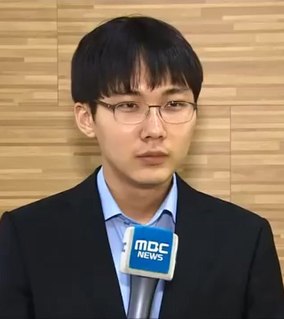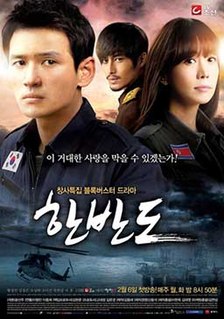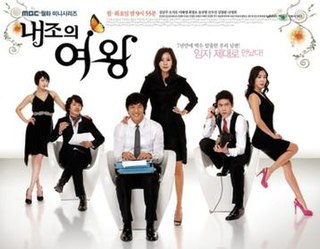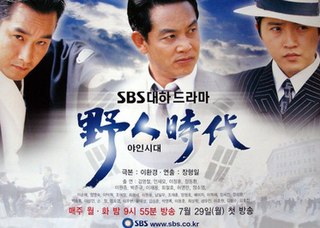Related Research Articles

South Korea competed as Korea at the 1996 Summer Olympics in Atlanta, United States. 300 competitors, 189 men and 111 women, took part in 160 events in 25 sports.

The Korean independence movement was a military and diplomatic campaign to achieve the independence of Korea from Japan. After the Japanese annexation of Korea in 1910, Korea's domestic resistance peaked in the March 1st Movement, which was crushed and sent Korean leaders to flee into China. In China, Korean independence activists built ties with the National Government of the Republic of China which supported the Provisional Government of the Republic of Korea (KPG), as a government in exile. At the same time, the Korean Liberation Army, which operated under the Chinese National Military Council and then the KPG, led attacks against Japan.

Luo Xihe is a Chinese professional Go player.
Choi Cheol-han is a South Korean professional Go player. He is the fourth youngest to become a professional Go player in South Korean history behind Cho Hun-hyun, Lee Chang-ho and Cho Hye-yeon. His nickname is "The Viper".

Kia Tigers is a South Korean professional baseball team founded in 1982 and based in the southwestern city of Gwangju. The Tigers are a members of the KBO League and are the most successful team in Korean baseball, having won the national Korean Series championship 11 times with a perfect 11–0 record.

The 2009 Korean League Cup, also known as the Peace Cup Korea 2009, was the 22nd competition of the Korean League Cup. It began on 25 March 2009, and ended on 16 September 2009.

Park Junghwan is a South Korean professional Go player of 9-dan rank.
The 16th LG Cup began on 13 June 2011 and concluded on 15 February 2012. Jiang Weijie won the title, defeating Lee Chang-ho in the final. 32 players from four countries competed in the final knockout tournament:
The 15th LG Cup began on 7 June 2010 and concluded on 23 February 2011. Piao Wenyao won the title, defeating compatriot Kong Jie in the final. 32 players from four countries competed in the final knockout tournament:
The 6th Ing Cup began on 30 April 2008 and concluded on 23 April 2009. Choi Cheol-han won the title, beating Lee Chang-ho 3–1 in the finals.
The 5th Ing Cup began on 20 April 2004 and concluded on 5 March 2005. Chang Hao defeated Choi Cheol-han 3–1 in the finals.

Korean Peninsula is a 2012 South Korean television series starring Hwang Jung-min and Kim Jung-eun. It aired on newly launched cable channel TV Chosun from February 6 to April 3, 2012 on Mondays and Tuesdays at 20:50 for 18 episodes.

Life Is Beautiful is a 2010 South Korean television series starring Song Chang-eui, Lee Sang-woo, Lee Sang-yoon and Nam Sang-mi. It aired on SBS from March 20 to November 7, 2010 on Saturdays and Sundays at 21:45 for 63 episodes.

Queen of Housewives is a 2009 South Korean romantic comedy television series, starring Kim Nam-joo, Oh Ji-ho, Yoon Sang-hyun, Lee Hye-young, Choi Cheol-ho, and Sunwoo Sun. It depicts the life of "naejo," housewives who devote their entire lives to their husbands' success, but with a more comedic and aggressive twist. It aired on MBC from March 16 to May 19, 2009 on Mondays and Tuesdays at 21:55 for 20 episodes.

The Good Wife is a South Korean television series starring Jeon Do-yeon, Yoo Ji-tae and Yoon Kye-sang. It is a Korean drama remake of the American television series of the same title which aired on CBS from 2009 to 2016. It replaced Dear My Friends and aired on the cable network tvN every Fridays and Saturdays at 20:30 (KST) for 16 episodes from July 8 to August 27, 2016.

Rustic Period, lit. The Age of Wild Men, is a South Korean television series aired from July 29, 2002 to September 30, 2003 on SBS. It focused on the life of historical figure Kim Du-han, a former mob leader turned politician, and the tumultuous modern history of Korea from the Japanese occupation to Park Chung-hee regime.

Times is a 2021 South Korean television series starring Lee Seo-jin, Lee Joo-young, Kim Yeong-cheol and Moon Jeong-hee. It aired on OCN from February 20 to March 28, 2021.
References
- ↑ "54 Kuksu(National champion)". igokisen.web.fc2.com. Retrieved 3 June 2011.[ permanent dead link ]